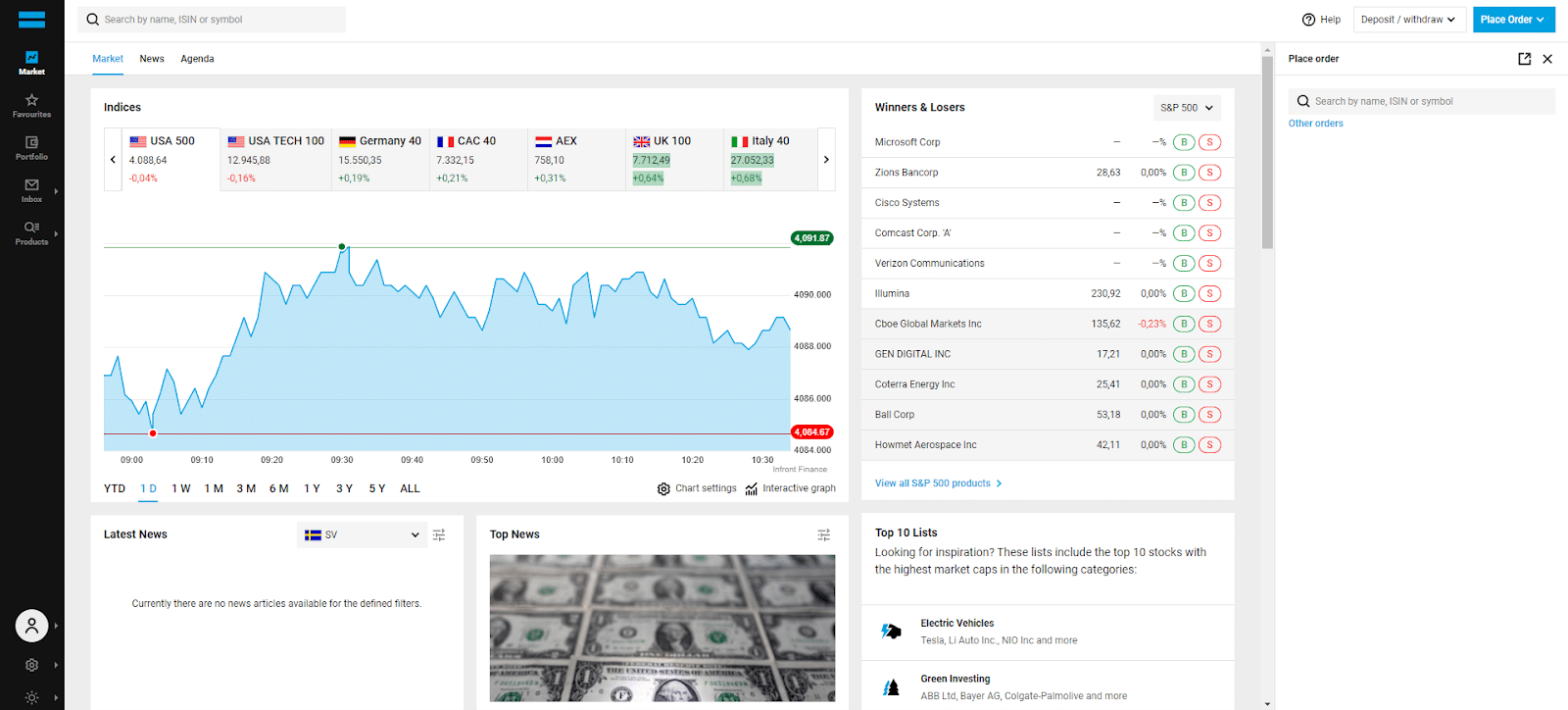Are you confused about whether to choose DEGIRO or Revolut Trading as a broker for your investing needs?
In this side-by-side comparison, we analyse DEGIRO and Revolut Trading to help you understand how these apps compare on some of the most common features and make a better-informed decision about the best broker for you.
Below, you’ll find the pros and cons of each broker, as well as a comparison table that features the different fees charged, the financial instruments supported, the regulation, and more. Keep reading!
DEGIRO vs Revolut Trading
- DEGIRO is our recommendation. It is ideal for low-cost trading from Europe.
Disclaimer: Investing involves risk of loss. - Revolut, on the other hand, we recommend for beginner investors looking for US stocks.
DEGIRO doesn’t offer interest on users’ cash balances, and is generally more expensive than Revolut. But, on the other hand, DEGIRO is an older broker, with a strong track record, and is a company focused on investments. So it’s our recommendation overall.
Revolut, on the other hand, is best if you want quick exposure to popular stocks and ETFs.
Side-by-side comparison
| Brokers | DEGIRO | Revolut Trading |
| Demo account | No | No |
| Account minimum | €/£1 | €/£1 |
| Interest on uninvested cash (annually) | 0% | Revolut US: Up to 3.50% in USD; Revolut International: 0% |
| US stocks fees | €/£1 (+ €/£1 flat handling fee) | One free trade per month (Afterwards, it varies according to your country of residency) |
| EU stock fees | €/£3.90 (+ €/£1 flat handling fee) | Not applicable |
| ETFs | ETF Core List: €/£0 (+€/£1 flat handling fee) – Other ETFs: €/£2 (+€/£1 flat handling fee) | Not applicable |
| Currency conversion fee | 0.25% | 0% up to €/£1,000 per month (0.40% above the €/£1,000 of free allowance.) |
| Regulators | AFM, DNB | SEC, FCA (as an AR), Bank of Lithuania |
About DEGIRO
DEGIRO is a European low-cost brokerage firm that has become very popular due to its low rates! With over 2.8 million users, the platform has become widely known for its “do-it-yourself” philosophy.
It offers a wide range of financial assets to trade, including stocks, ETFs (check the list of free ETFs), bonds, options, futures contracts, warrants, investment funds, and some leveraged products.
The mobile app and web trading platform are basic but very efficient and straightforward to use. Some downsides are the absence of any significant fundamental research and the lack of pricing alerts.
DEGIRO’s pros and cons
Pros
- ETF Core Selection list (external fees apply)
- User-friendly web and mobile app
- Wide range of investment options
- Education material: Investor’s Academy and Investing with DEGIRO
- Low overall commission structure
- No account opening, inactivity, or withdrawal fee
Cons
- 0.25% currency conversion fee (charged if you deposit or invest in a different currency than your base currency)
- €/£1 flat handling fee (charged in most transactions)
- €/£2.50 of connectivity fee (paid annually), per exchange where you’re invested
- Does not offer Forex, CFDs, and Cryptos
- No ISA account (for UK residents)
- Low-quality customer support
- No interest paid on cash balances
About Revolut Trading
Revolut was created to disrupt the banking industry by reducing and removing fees associated with the traditional banking system.
It also offers other financial services, namely the possibility of buying US stocks, cryptocurrencies, and precious metals (Gold and Silver).
The quick access to investment products, combined with low commissions, remains the most engaging differential that enables Revolut to stand out from its competitors.
Revolut Trading pros and cons
Pros
- Simple trading platform
- Easy account opening process
- At least, one free trade per month
- Low trading commissions
- No inactivity fee
Cons
- Limited range of investment instruments
- Investments not covered by the Financial Services Compensation Scheme
How to invest in the S&P 500 on DEGIRO and Revolut
Want to learn how to invest in the S&P 500 on both DEGIRO, as well as Revolut?
Check our step-by-step videos below.
It might also help you decide which app is more user-friendly and how you feel about each broker:
DEGIRO vs Revolut Trading: Verdict
DEGIRO
Best overallRevolut Trading
Best for European beginner investors looking for quick exposure to US stocks
Choosing between these two online brokers isn’t always an obvious decision. The differences between DEGIRO and Revolut Trading come from the trading platforms, products, fees, and security. Do you prefer a basic trading platform? Do you want to invest in ETFs only? Do you value security more?
Ultimately, the best online broker for you will depend on your profile, personal preferences, and objectives. Explore the websites above and decide for yourself!
Want to know more about DEGIRO and Revolut Trading? Explore our in-depth broker reviews, comparison table, and BrokerMatch tool.
Disclaimer: Investing involves risk of loss.






